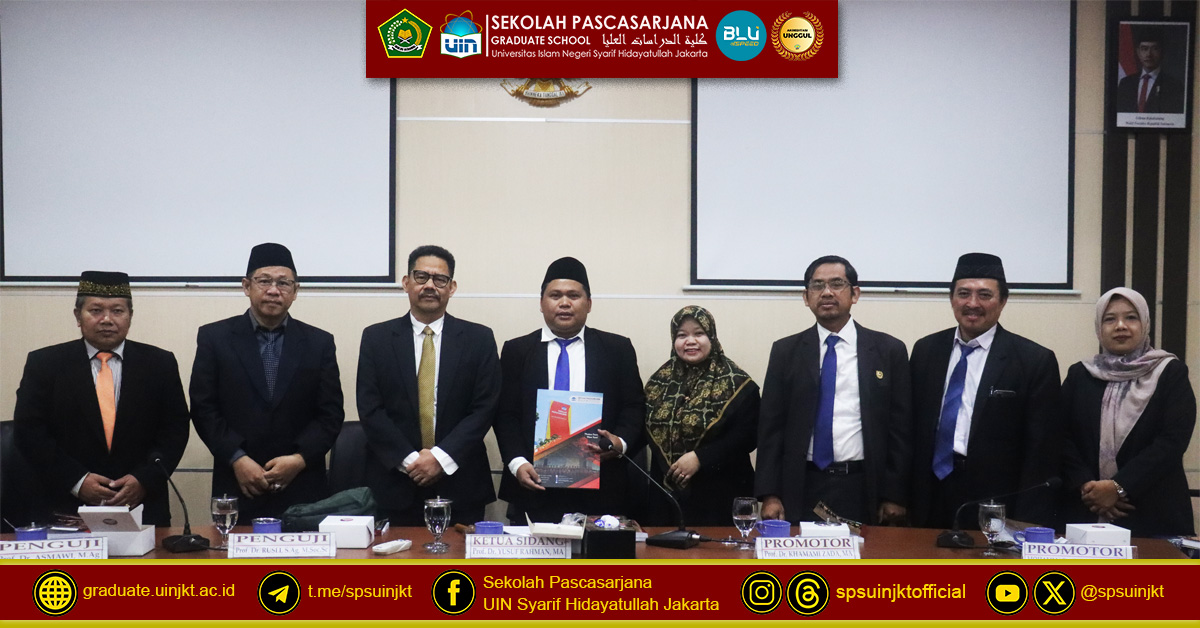Ahmad Rifa'i's Thesis Exam, Jihād, Radicalism, and Terrorism in Fiqh
SPs Theater Room UIN Jakarta, SPs NEWS: The Graduate School of Syarif Hidayatullah State Islamic University Jakarta held the 2764th Thesis Exam at the SPs Theater Room of UIN Jakarta, on Tuesday, July 22, 2025 with candidate Ahmad Rifa'i.
Ahmad Rifa'i is a student of the Master of Islamic Studies study program with a concentration in Religion and Law. Khaeron wrote a dissertation entitled "Jihād, Radicalism, and Terrorism in Fiqh (A Comparative Study of the Book of Badā'i' al-Ṣanā'i' fī Tartīb al-Sharā'i' and the Book of Fatḥ al-Mu'īn)"
Rifa'i's research focuses on the concept of jihad, legal istinbat, and its correlation with radicalism and terrorism. Using the approach of fiqh and social history studies, this thesis comparatively analyzes the thoughts of Imam al-Kāsānī in the book Badā'i' al-Ṣanā'i' fī Tartīb al-Sharā'i' and Imam al-Zain al-Dīn al-Malībārī in the book Fatḥ al-Mu'īn. The two yellow books are primary sources, complemented by various relevant secondary sources.
The main argument of this thesis emphasizes that the yellow book, especially in the field of jurisprudence, has a crucial role in shaping the religious understanding of Muslims. Unfortunately, these books are often misused as religious legitimacy by radical groups and terrorists, who claim their actions as jihad fī sabīlillah. This is an important highlight in an effort to straighten out the understanding of religious doctrine.
Interesting findings from this study show the differences and similarities between the two books. The book of Fatḥ al-Mu'īn understands jihad in two forms, namely war and non-war, while Badā'i' al-Ṣanā'i' fī Tartīb al-Sharā'i' only defines it as war. However, the two agreed to strongly oppose radicalism and terrorism movements, categorizing them as Qāṭi' al-Ṭarīq (street robbers) and al-Bughāt (rebels).
The implications of this thesis are very relevant to today's global dynamics, especially in responding to various forms of jihad and fiqh's position against radical groups and terrorists. Rifa'i concludes that fiqh books from various classical, mediae, and modern periods consistently identify radicalism and terrorism as acts of Qāṭi' al-Ṭarīq and al-Bughāt. It strongly refutes the radical group's propaganda narrative that their actions are part of jihad.
Furthermore, Ahmad Rifa'i's thesis emphatically refutes the views of researchers such as Jack Nelson-Pallmeyer, Horrison DuBosar, Vinod Saigal, and Charles Kimbal, who conclude that many verses of the Qur'an represent war, the spread of Islam through violence, and that jihad is a doctrine of radicalism and terrorism. In fact, according to Imam al-Kāsānī, fighting radical groups and terrorists is jihad fī sabīlillah whose law is obligatory, because they have distorted and misled religious understanding.
Ahmad Rifa'i successfully defended his thesis under the guidance of Prof. Dr. Khamami Zada, MA and Mohammad Adnan, LL.M, Ph.D, and was tested in front of a board of examiners consisting of Prof. Dr. Yusuf Rahman, MA, Prof. Dr. Khamami Zada, MA, Mohammad Adnan, LL.M, Ph.D, Prof. Dr. Rusli, S.Ag, M.Soc.Sc and Prof. Dr. Asmawi, M.Ag.
After paying attention to the thesis writing, the comments of the examiner team and the candidate's answers, the examiner team determined that Khaeron Sirin graduated with the predicate of Very Satisfactory. Ahmad Rifa'i is the 2764th Doctor in the field of Islamic Studies, in the master's program of the Graduate School of UIN Syarif Hidayatullah Jakarta. (JA)

